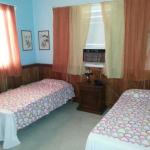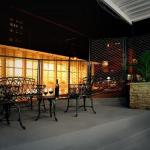
Waiting for another ‘gringo’ invasion
HAVANA — This capital city and other cities on the island where Cubans rent their homes to foreigners are already booked up.
Right now, there are few options for those visitors who, like free electrons, look for a native dwelling, not a tourist installation, where they can spend Christmas and New Year in a pleasant climate and a memorable social environment.
And now, as we all know, comes the good news that the motto of our neighbors to the north will be “Hand in hand and face to face.”
For a while now, some enterprising Cubans have been advertising intensive, three-month courses in English to the locals. Next, they’ll be guaranteeing that they can teach you to read Shakespeare in the original Olde English in one week. Or, emulating Dale Carnegie, they’ll offer 72-hour courses on “How To Deal With a Tourist.”
Although it annoys some in the Ministry of Tourism and other government or political agencies, the tourists’ modality of lodging in the house of a Cuban family is popular not so much because of the savings implied but because of the pleasure of meeting and living among ordinary Cubans.
While some tourists prefer five-star hotels with five-star toilet paper, others enjoy the street vendors’ cries that pierce windows like spears. Others look for bed-and-breakfast places in the countryside just to see how the farmers milk a cow — or a goat, let me not exaggerate.
Not much is new in what is called the “no-chimneys industry,” except for the imminent start of an authentic “gringo invasion,” for which the country’s infrastructure is not yet fully prepared. The sooner it begins, the briefer the difficulties or obstacles and the sooner we’ll need to find solutions for them.
The number of visitors from the United States in the past 12 months ranges from 400,000 to half a million. The number that the experts predict for the future is impressive: from 1 million to 4 million a year.
We have seen some questionable studies where Cuban experts insist that the volume of tourists would cause the water and sewage systems to collapse, that the refrigerated storage facilities wouldn’t be enough to feed so many people, and that the dockside facilities would not be sufficient if the thousands of yachts in Miami decided to sail to the island for a weekend vacation.
For sure, the authorities that oversee tourism and related activities must have thought of this at the time when the mass arrival of U.S. tourists was a mere mental exercise. Now, as in the famous children’s tale, the wolf is knocking at the door.
A jocular Cuban (of the kind who cracks jokes in funerals or in a cemetery) was telling me that Cuba is a country of lurches, where today’s evil will be tomorrow’s goodness, and today’s goodness will be tomorrow’s jail sentence.
He said that we’re not far from the day when, by official decree, we’ll be called on to perform “a patriotic and altruistic gesture” — to lodge a gringo in every available house.
Joking aside, people with less of a funny bone say that Cuba should be a country of services with the accent on tourism, because the island contains all the attractive features now dispersed throughout other Caribbean nations.
To do that, they say, Cuba should encourage a local industry that will satisfy, to a great degree, the demands of the tourism industry. It should also encourage a prosperous agriculture that can replace, say, the frozen greens that today we import from Chile.
Cuba, ladies and gentlemen, has just appeared on the charts of cruise-ship lines. This destination didn’t exist before but is there now, and here we are, waiting — and not in war footing.
Organized tourism, an ecological tourism that doesn’t damage the environment, and other attractions of proven efficiency and economic rewards — biotechnology, the pharmaceutical industry, etc. — will bring to Cuba prosperity, well-being and a guarantee of continuity in the delivery of free health care and education to its people, as well as security in the provision of pensions for its retirees.
Let us wait then with open arms and prepare for the almost imminent arrival of great multitudes. All the more so, because we have often reproached the Empire for not allowing its citizens to visit our beautiful land, home to the greatest asset other than beaches, colonial cities, mountain climbing, history and culture — the nature of Cuban people, an asset with great value.
And — citing poet Antonio Machado — let’s not mistake value for price.
Galery: Privete housing in Havana.
Photos taken from www.revolico.com
















